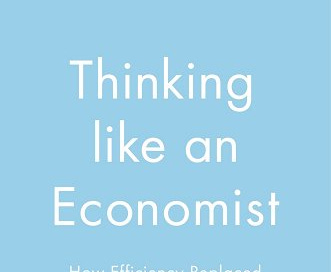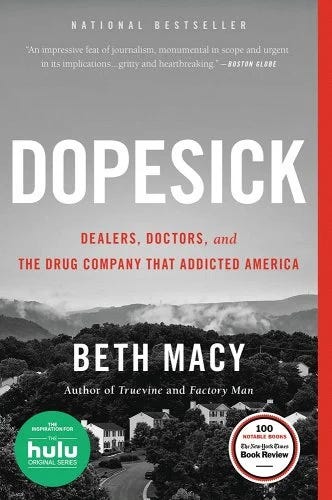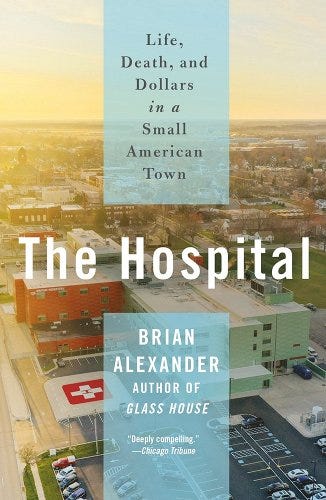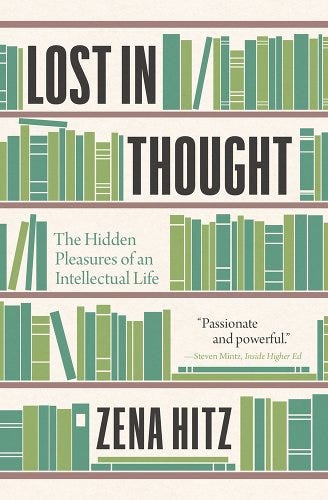Note: The text in this edition is longer than what will automatically appear in most email programs. To see the entire post, click through to read on the web.
—
My Chicago Tribune column this week is about Thinking Like and Economist: How Efficiency Replaced Equality in U.S. Public Policy by Beth Popp Berman.
It’s an interesting and accessible read, but I’ll be honest, It’s not the kind of book that tons of people are going to seek out and enjoy because it is published by an academic press, and primarily intended for an academic audience. Despite not being an academic, I sought this book out because I think it tells an important story.
That story is the history of how what Berman calls the “economic style of reasoning” has come to dominate every level of of American life when it comes to public policy.
Economic thinking measures things according to economic values, like “efficiency,” but as Berman argues, those who embrace this framework do not see efficiency as a value - something subjective, and open to interpretation - at all. They see efficiency more like a ruler, an objective measurement, in this case not of length, but of policy efficacy. The more efficient, the better.
This style of reasoning crowds out other considerations, namely moral ones. There’s a lot of areas where this mindset has become the atmosphere that public policy people breathe, as opposed to one way of many of analyzing a particular situation.
There’s a lot of areas where this has manifested, but an obvious one is anti-trust, where the standard for judging whether or not a merger or company expansion into new areas is judged problematic based almost entirely on the cost to the end user. This means that Facebook can swallow Instagram with nary a blip, because after all, the service is “free.” Meanwhile, we’re paying in the form of our privacy, and a severely degraded public square as social media becomes a high speed vector for misinformation.
Amazon can continue to expand not just in retail, but also the production and distribution of books and other media, and even web services. If you are on the internet, you are interacting with Amazon every day, multiple times a day. For now, Amazon makes us feel like goods are (relatively) cheap and ubiquitous but what happens when Amazon has gotten so big that there is literally no one left to compete with them?
Regular readers will perhaps recall my Q&A with Valerie Merians and Dennis Johnson of Melville House Books and how Johnson explained the ways that Amazon’s “thuggish” and “mercenary” attitude towards books and publishing has made it increasingly difficult for Melville to publish their books.
Anti-trust law grounded in economic thinking has nothing to say on this kind of problem.
Berman’s book is a kind of history showing how the economic style of reasoning took hold in such a way - taking seed in the 1960s, and being fully rooted by the 1990s - that for a long time it hasn’t been questioned. When markets failed to behave according to an economic theory, it wasn’t a problem with the theory, but the market.
Consider healthcare, where all kinds of attempts have been made to turn individuals into healthcare “consumers” making choices that force providers to provide superior services for increasingly cheaper prices. This has resulted not in cheaper and better healthcare. The exception of course, is seniors who benefit from government managed healthcare.
I’ve been waiting for a book like Berman’s for a long time. In 2019, I personally declared how I’d been “indoctrinated” by Econ 101 in college, and it had taken 30 years to recognize the extent of the damage.
Anyway, I can start to get a little heated up about this. Fortunately, there’s a number of books out there that either put the lie to economic thinking, or show alternative ways of seeing the world and deciding what we should value. I had intended to use the column to share some books that I think provide a kind of antidote to economic thinking, but I only get 600 words a week, so there wasn’t room.
Fortunately, I can yammer on as much as I want here. The benefits of self-employment, I guess.
Capital in the Twenty-First Century by Thomas Piketty
Piketty’s history of economic inequality shows how the very structures of society prevent us from addressing that inequality. Any time you see a politician talking about means testing a benefit meant for low income people to make sure it only goes to those who “deserve” help, you’re looking at the dynamics Piketty explores in exhaustive depth here.
Dopesick: Dealers, Doctors, and the Drug Company That Addicted America by Beth Macy
This is the on-the-ground story of the opioid crisis in America, a crisis literally created by the desire of a drug company to establish a “market” and the willingness of doctors, consultants, and even regulators to privilege that market over the well-being of the citizenry. Both sad and enraging.
The Hospital: Life, Death, and Dollars in an American Small Town by Brian Alexander
A look at the extreme dysfunction of the American health care system through the lens of a single independent hospital in small-town Ohio. Alexander goes deep with the patients, doctors, and administrators to show how the need to chase revenue distorts the way health care is delivered and paid for in this country. You could not conceive of a less cost-effective system than the one we have if your goal is to maximize access to reasonable health care.
The Sum of Us: What Racism Costs Everyone and How We Can Prosper Together by Heather McGhee
The brilliance of McGhee’s book is that she understands the economic reasoning mindset so well, she uses its framework and terminology to show how structural racism is actually an assault on economic sense-making. McGhee connects the moral stain with the ways “everyone” (by which she really means white people) is harmed economically. It’s actually sort of a shame that we require a book like this to argue for changes in policy that will increase equity, rather than simply embracing the moral point of view, but the book makes an airtight case.
Lost in Thought: The Hidden Pleasures of and Intellectual Life by Zena Hitz
An antidote to the mentality that the value of an education is housed primarily or solely attached to a credential. Hits makes a compelling case for a life dedicated literally to learning and thinking about stuff, and the many rewards that come with such a life. I knew that I was allow the poison of the economic way of thinking when I would think that Hitz sounds overblown or even naive about the “practical uselessness” of intellectual study, which is why I appreciated the book even more.
The Gift: How the Creative Spirit Transforms the World by Lewis Hyde
This is the creative yang to Hitz’s intellectual yin, and while it is concerned with matters of artistic expression and reception, it is really making the same case as Hitz’s book, that some things are too meaningful to be commodified. Art will always exist no matter the state of the marketplace for it, and nothing will quell the human urge to make and experience that art.
Sustainable. Resilient. Free.: The Future of Public Higher Education by John Warner
Forgive the indulgence, but I wrote this book to explicitly challenge the dominant thinking around higher education, that it is primarily important for the credentials it confers, credentials that are private goods confined to the individuals that have them. This mindset has been hugely damaging to our higher education institutions, the people who attend and work in them, and even, I would argue to the country as a whole. The book is my attempt to show how institutions oriented around “mission” - teaching, learning, and expanding the boundaries of knowledge - as opposed to “operations” - hustling to realize as much tuition revenue as possible - will not only benefit everyone who intersects with these institutions, but would also make the aggregate cost of post-secondary education much cheaper.
I don’t know how convincing any of this. I do know that the “economic style of reasoning” seems to remain dominant in our governmental and public policy circles. Perhaps the evidence of how poorly so many of these systems seem to work is enough to at least imagine there might be other ways of sorting the world.
Links
The New York Times Book Review has a new editor, Gilbert Cruz. I know nothing about the man other than what I can read in this profile, but I’m certain he’ll be better than the last one.
Buzzfeed has “17 Books from Independent Publishers You Need to Read This Summer.” I don’t know what will happen if you don’t read them, but nothing good, I’m sure.
The Booker Prize announced its longlist of nominees this week, including The Trees by Percival Everett and Booth by Karen Joy Fowler.
Mohsin Hamid, author of the newly released, The Last White Man does the “by the book” interview and offers some interesting and relatable insights.
If you missed it earlier in the week, Phyllis Mann shared a book she wishes more people knew about in the first of what I hope is a long series here at The Biblioracle Recommends.
Recommendations
All books linked here are part of The Biblioracle Recommends bookshop at Bookshop.org. Affiliate income for purchases through the bookshop goes to Open Books in Chicago.
Affiliate income is up to $173.60 for the year.1
1. Crying in H Mart by Michelle Zauner
2. Black Cake by Charmaine Wilkerson
3. The Secret History by Donna Tartt
4. The Paper Palace by Miranda Cowley Heller
5. Wish You Were Here by Jodi Picoult
Linda T. - Jacksonville, FL
The book I want to recommend to everyone right now, as indicated by last week’s newsletter, is Notes on Our Sudden Disappearance, but I’ll do my duty and give Linda a custom recommendation: How about The Nest by Cynthia D’Aprix Sweeney.
From the beginning, in an act of defiance against economic thinking, which dictates that making content exclusive would lead to more revenue, I pledged to keep the content here free to all subscribers. This is only possible if those who can pay help keep this effort going. If you’ve read this far, and have enjoyed the newsletter, please consider a paid subscription.
Or even, give a gift subscription to someone else.
Thanks for reading. A rainy day where I am, so I see lots of hours with my nose in a book ahead of me.
JW
The Biblioracle.
I’ll match affiliate income up to 5% of annualized revenue for the newsletter, or $500, whichever is larger.












Thank you for the list of books that encourage alternative ways of finding meaning in a capitalist, workaholic society. And if I can be so bold, I'd like to recommend, Biblioracle-style, another such book for this list: LEISURE: THE BASIS OF CULTURE by Josef Pieper.
Great rec list! And thanks especially for the review of Thinking Like an Economist. I was drawn to this book too but even as an academic I found it inaccessible. I found the writing quite dense and academic that I put it down, unfortunately. Academic Presses come out regularly with accessible books, but this one missed the mark, especially coming from Princeton, which is one of my top read publishers.